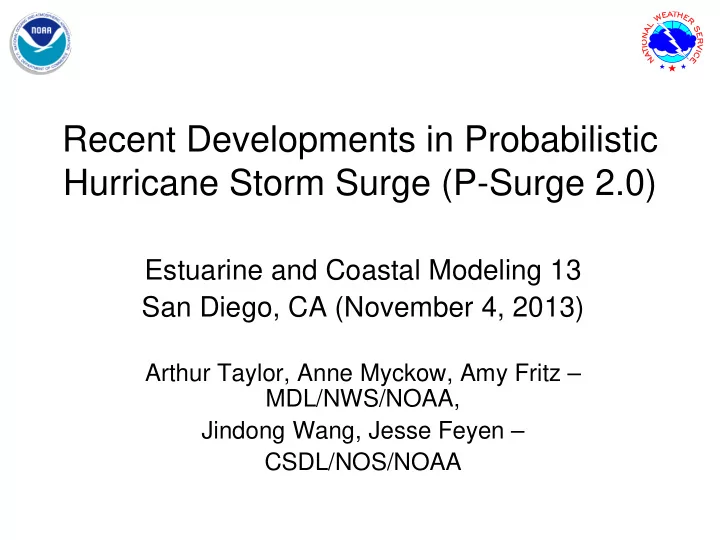

Recent Developments in Probabilistic Hurricane Storm Surge (P-Surge 2.0) Estuarine and Coastal Modeling 13 San Diego, CA (November 4, 2013) Arthur Taylor, Anne Myckow, Amy Fritz – MDL/NWS/NOAA, Jindong Wang, Jesse Feyen – CSDL/NOS/NOAA
Hurricane Ivan: A case study 2
P-Surge Methodology Need: Probabilistic information within 1 hour of advisory Derive probabilistic guidance from a set of SLOSH (Sea Lake and Overland Surges from Hurricanes) model runs • Ensemble is centered on NHC’s official advisory • Error space is based on 5-year Mean Absolute Error (MAE); assumed normal distribution; and that MAE = 0.7979 sigma • Error space is sampled via representative storms rather than via random sampling Why SLOSH? • Efficient (100s of runs in 30 minutes with few CPU) • Maintained as part of hurricane evacuation studies • Parametric wind model for forcing • Overland flooding 3
Ivan Advisory 54 4
P-Surge - Vary Cross Track 5
P-Surge – Vary Other Variables • Size: Small (30%), Medium (40%), Large (30%) • Forward Speed: Fast (30%), Medium (40%), Slow (30%) • Intensity: Strong (30%), Medium (40%), Weak (30%) 6
Probabilistic product shows considerable surge threat to Pensacola area 7
P-Surge 2.0 http://slosh.nws.noaa.gov/psurge2.0 8
P-Surge 2.0 Enhancements 1. Most recent SLOSH basins – Advantage : More accurate storm surge using modern vertical datum (NAVD-88) – Impact : Slower run times due to higher resolution 2. Above ground level as well as above datum – Advantage : Enhanced communication as general users do not understand datums – Impact : More files to process 9
P-Surge 2.0 Enhancements 3. SLOSH + Tide – Each ensemble member defines time allowing addition of a gridded tide – Advantage : More accurate overland inundation – Impact : More along track error samples (from 3 to 7) 4. Time component – Create (13) 6-hour cumulative and (13) 6-hour incremental probability products rather than (1) 80- hour cumulative probability product – Advantage : Provides timing guidance – Impact : Larger and more numerous files to process 10
SLOSH + Tides • Extract tidal constituents at every SLOSH grid cell from EC2012 • Version 1 – Run SLOSH, add tide to wet cells, output result – Issue: Tide not considered during inundation step – Issue: Extrapolated tidal values overland 11
SLOSH + Tides • Version 2 – Initialize with tide (time = t0), SLOSH moves tide and surge to time = t1, subtract tide (time = t0) and add tide (time = t1), Repeat – Issue: Extrapolated tidal values overland – Issue: Wetting/Drying impacts computation • Version 3 – Use constituents to compute tide on boundary – Issue: Getting tide through narrow mouths into estuaries – Issue: Need to be more efficient about spin-up time 12
SLOSH + Tides • Version 2.1.x – Restrict Version 2 to values deeper than x feet – Issue 1: Tidal constituents still extracted for rivers – Issue 2 : Penobscot Bay tides incorrectly propagated – Solution 2: treat values less than -290 feet as hydrostatic heights (only barometric pressure forcing) • Version 2.2.x – Restrict Version 2.1.x to full width grid cells – Issue: The -290 feet restriction caused instability in most recent New Orleans basin 13
Storm Surge with Tide Exceeded by 10% of Ensemble Members 14
Storm Surge with Tide Exceeded by 10% of Ensemble Members 15
Examples of Future Work • SLOSH + tide Version 3 (Arakawa C-Grid) • Handle Tropical Storms • Increase the 48-hour forecast time range • Increase temporal resolution from 6-h to 1-h • Handle multiple storms simultaneously • Nest smaller finer tropical basins within larger coarser extra-tropical basins • SLOSH + waves • Handle Puerto Rico and Virgin Islands • Validation 16
Recommend
More recommend